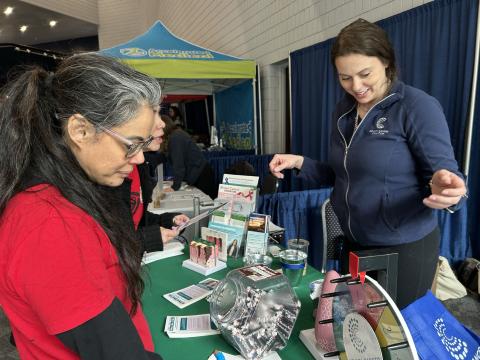Task force to add improving cervical cancer screening rates to 2022 efforts
01 January, 2022
Nevada Cancer Coalition’s Early Detection Task Force is taking up cervical cancer screening in its first meeting of 2022, seeking to find answers as to why Pap testing rates have declined and how clinical and public health professionals can work together to turn that around.
Background
Public health professionals knew that a decline in HPV vaccinations was likely. The COVID-19 pandemic upended health systems, postponed routine health care, and likely reduced enforcement of immunization requirements for school attendance. All of those factors were anticipated to reduce the number of Nevada adolescents ages 13 to 17 up-to-date with HPV vaccination.
They did. The percent of youth ages 13 to 17 up to date with HPV vaccination based on 2020 data shows a decline from 52.9% in 2019 to 50.1% in 2020.
The Centers for Disease Control and Prevention charted a similar drop in cervical cancer screening. In 2020, just 76% of women ages 21 to 65 reported having had a Pap test within the past three years. That’s a drop from 78.9% reported in 2018.
In Nevada, this is where the stories diverge. HPV vaccination rates have been climbing steadily since the first vaccine was introduced in 2006. Meanwhile, cervical cancer screening rates have remained stagnant, bobbing in the high to low 70% range, and nowhere near the 84.3% national Healthy People 2030 target.
In Nevada, the goal is to reach 82.9% of women ages 21-65 screened for cervical cancer within the past three years by 2025, putting the state on track to reach that national goal.
Exploring the why
At the January 20 Early Detection Task Force, participants will consider what they believe are the reasons by Pap testing has declined in Nevada. Research shows that women vaccinated for HPV are actually more likely to be up to date with cervical cancer screening.
Some have posited that as younger generations shift the ways they access health care, routine screening recommendations aren’t provided or received. Studies show that millennials are less likely to have a primary care provider and more likely to seek out urgent care or walk-in facilities only when health concerns arise. Experts say that’s causing a disconnect between young people and health care and emphasizing acute care over long term wellness.
Other questions the group will consider are whether changes in the way birth control is accessed and prescribed or changes in screening recommendations have impacted Pap testing rates.
Learn more about the Early Detection Task Force here and read more about NCC’s efforts to improve cervical cancer screening and other early detection rates in the 2021-2025 Nevada Cancer Plan.
Quick facts about cervical cancer in Nevada
- Nevada is among the top ten states for highest incidence of cervical cancer, with 8.9 cases per 100,000.
- It’s estimated 160 Nevada women were diagnosed with cervical cancer in 2021.
- Cervical cancer can be prevented with HPV vaccination and timely and appropriate screening.
- Nationally, women who are Hispanic, Black, or American Indian/Alaska Native are slightly more likely to be diagnosed with cervical cancer that women who are white or Asian/Pacific Islander.
- Women ages 40 to 64 are more likely to be diagnosed with cervical cancer than those 39 and younger.
- Current screening guidelines from the U.S. Preventive Services Task Force recommend screening for cervical cancer with Pap test every three years for women 21-29. For women ages 30 to 65 the recommendation is for screening every three years with Pap test alone, every five years with high risk HPV testing alone, or every five years with high risk HPV and Pap testing in combination.
- National Cervical Cancer Coalition provides tools and resources for Cervical Health Awareness Month, recognized nationally each January. Get information here.
You May Also Like

April 2025 Awareness Month Materials
03.28.2025
April is the awareness month for both Head & Neck cancers and Testicular cancer.

April 2025 Awareness Month Materials
03.28.2025
April is the awareness month for both Head & Neck cancers and Testicular cancer.

NCC Travels I-80 Educating Nevadans on Cancer
03.24.2025
Every March the team from Nevada Cancer Coalition hits the road, traveling along Interstate 80 to attend the popular Humboldt General Hospital Hea